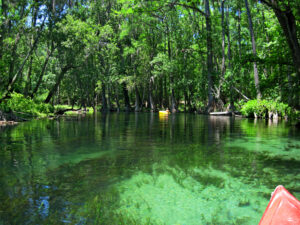The 2023 Florida legislative session provides an opportunity to deepen the state’s commitments to improving water quality.
North Florida, along with Central Florida, is home to the densest concentration of freshwater springs in the world. The region’s economy heavily depends on this critical natural resource. Unfortunately, North Florida springs face several human-created stressors that impair the quality and quantity of spring water and their related ecosystems.
Recreational spring water activities contribute significantly to local employment and tax revenue. However, water flow and quality in North Florida have undergone drastic changes over the last decade due to “nutrient loading” and excessive pumping.

Nutrient loading, which is the increased nutrient concentration in spring waters due to growing populations, failing septic tanks and the use of synthetic fertilizers, has increased algae blooms. These excessive algae blooms have impacted marine animals, recreation, businesses, and property values by contaminating drinking water, leading to the loss of state and local revenues.
Additionally, excessive pumping from bottling companies, municipal water and agriculture has led to a one-third decline in water flow across all of Florida’s springs.
Lower spring flows and deteriorating water quality have both negatively impacted spring-related recreational use, reducing economic activity in North Florida.
A recent study measuring the perceptions of visitors to four springs in the Suwannee River and Santa Fe River Basin in North Central Florida indicated that 90% of the visitors visited the springs for the sole purpose of recreation. Researchers found a strong positive association between visitor trip frequency and water clarity, estimating that a one-unit increase in the perceived water clarity can be attributed to 27% more visits.

In 2016, the Legislature chose 30 “outstanding” springs of historical importance for additional protection and restoration, creating a series of Basin Management Action Plans (BMAPs) to address water quality issues stemming from nitrogen pollution. Earlier this year, Gov. Ron DeSantis signed an executive order directing $3.5 billion over the next four years to Everglades restoration and infrastructure projects to improve water quality and safeguard Florida’s water supply.
Unfortunately, the state has failed to implement necessary provisions to improve water quality in its Basin Management Action Plans despite legislative findings indicating urgent action. The BMAPs, for example, do not account for future population growth and increased pollution loading. Additionally, BMAPs lack a comprehensive monitoring process to measure compliance with water quality standards and identify areas of improvement.
This Florida legislative session provides an opportunity to address spring water reform. A logical start would be to consistently update BMAP regulations and practices to account for demographic changes.
Additionally, BMAP funding of integrated monitoring and modeling would accelerate progress toward restoration, prioritizing initiatives that address the most significant pollution sources in the most cost-effective way possible.
Finally, charging a fair market price for aquifer withdrawals from both public and private users is essential. This will not only discourage waste, but will also create incentives to develop new sources, raise revenues, and bring discipline and efficiency to the allocation of groundwater resources.
Adoption of these recommendations by the Legislature would not only support the future of these springs but also protect the economic value they present to northern Florida communities.
Jad Kabbani is a senior economics major at Florida State University and a research assistant in the DeVoe L. Moore Center in the College of Social Sciences and Public Policy. This opinion piece was originally published by the Tallahassee Democrat, which is a media partner of The Invading Sea.



